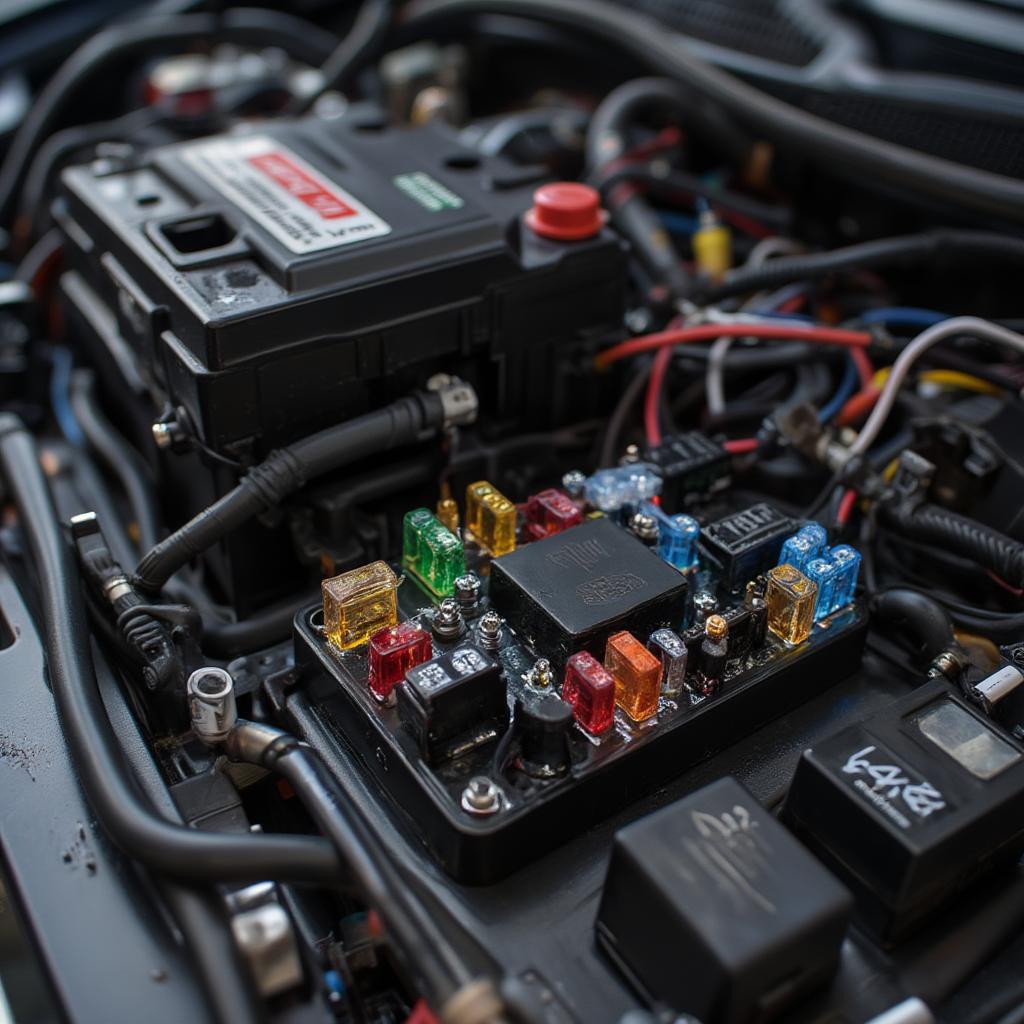Mastering the Road: How an Auto Tech Mechanic Keeps You Moving

The automotive world is constantly evolving, and at the heart of it all is the auto tech mechanic. These skilled professionals are the unsung heroes who keep our vehicles running smoothly and safely. From diagnosing complex engine issues to performing routine maintenance, their expertise is indispensable. But what exactly does an Auto Tech Mechanic do, and why is their role so crucial in today’s tech-driven automotive industry? Let’s dive into the details and explore the world of auto tech mechanics.
Understanding the Role of an Auto Tech Mechanic
So, what does a day in the life of an auto tech mechanic actually look like? It’s much more than just changing oil and tires. These professionals are now heavily involved in the intricate systems that make up modern vehicles, from hybrid powertrains to advanced driver-assistance systems (ADAS). They use a combination of hands-on skills and diagnostic technology to keep your car in top condition. An auto tech mechanic needs to be a problem solver, a technician, and a student of continuous learning, staying updated on the newest advancements. The core duties often include:
- Diagnostics: Utilizing sophisticated diagnostic tools to identify the root cause of mechanical and electrical problems.
- Repairs: Performing repairs on engines, transmissions, brakes, suspensions, and other critical components.
- Maintenance: Conducting routine maintenance such as oil changes, tire rotations, and fluid checks.
- Technology Integration: Working with the onboard computer systems and sophisticated electronics found in modern vehicles.
- Customer Service: Communicating with customers, explaining issues and recommendations in an understandable way.
The Evolving Skillset of the Modern Auto Tech Mechanic
The role of an auto tech mechanic has drastically changed. It’s not just about wrenches and screwdrivers anymore; it’s about technology, precision, and problem-solving. Modern cars are rolling computers. Mechanics must now have a strong grasp on electronics, computer systems, and software in order to perform their jobs effectively. Here’s a look at the skills that are now vital for any aspiring or established mechanic:
- Advanced Diagnostics: The ability to use diagnostic equipment to pinpoint electronic issues.
- Computer Systems Knowledge: Understanding of engine control units (ECU) and other onboard computer systems.
- Electrical Systems Expertise: Ability to repair and maintain the electrical components of a vehicle, including batteries, wiring, and sensors, as well as in-depth knowledge of the automotive electrical certification.
- Hybrid and Electric Vehicle Technology: Knowledge of the specialized systems found in hybrid and electric vehicles.
- Software Updates: Ability to update the software of various vehicle systems.
Why Continuous Learning is Essential for an Auto Tech Mechanic
The automotive industry is dynamic, with new technologies and systems emerging regularly. What’s considered cutting-edge today might be obsolete tomorrow. For an auto tech mechanic, continuous learning is not optional but absolutely necessary for professional development and career advancement. If you’re looking to sharpen your skillset, make sure to look into auto tech courses. Here’s why this is so crucial:
- Adapting to New Technologies: Staying updated with the latest advancements in automotive technology, including hybrid and electric powertrains, and advanced driver-assistance systems (ADAS).
- Maintaining Certification: Regular training is often required to maintain industry certifications, showing that the mechanic has achieved a certain level of competence.
- Improving Job Performance: Continuous learning enables mechanics to better diagnose and repair vehicles, which translates to a more efficient and cost-effective service for customers.
- Career Advancement: Mechanics who stay up-to-date with their skills are more likely to earn better positions and pay.
“The automotive world is changing rapidly, and mechanics need to be lifelong learners to keep up. I’ve seen firsthand how mechanics who don’t embrace new technology quickly fall behind. Staying ahead of the curve is key to success in this industry.” – Dr. Amelia Chen, Automotive Technology Educator
The Importance of Specialization for an Auto Tech Mechanic
As vehicles become more complex, some auto tech mechanics choose to specialize in particular areas. This level of expertise allows them to focus on areas that interest them, and allows them to develop specific skills that are valuable for customers. Some specialization areas include:
- Engine Repair: Focusing on the repair and maintenance of engines and related components.
- Transmission Systems: Expertise in repairing and servicing the transmission systems.
- Brake Systems: Specializing in brake repair and maintenance.
- Suspension Systems: Focusing on the repair and maintenance of a vehicle’s suspension and handling system.
- Electrical and Electronic Systems: Specializing in diagnostics and repair of electrical systems.
- Hybrid and Electric Vehicle Technology: Concentrating on the unique systems of hybrid and electric vehicles.
- Auto Body Repair: Focusing on the restoration and repair of a vehicle’s body panels.
Having a vehicle technology course will help you in this endeavor.
Diagnosing Modern Vehicle Issues
Diagnosing modern vehicle issues can be challenging due to the complexity of automotive systems. Here are some strategies mechanics will use to tackle difficult problems:
- Systematic Approach: Using a step-by-step approach to identifying the root cause of the issue.
- Diagnostic Tools: Utilizing advanced diagnostic scanners and software to read codes and analyze data.
- Experience and Knowledge: Drawing upon personal experience and knowledge of common problems.
- Collaboration: Working with other mechanics when facing a challenging diagnostic situation.
- Data Analysis: Analyzing the live data from various sensors and systems to identify anomalies.
- Customer Input: Listening to the customer’s description of the issue to gain valuable insight.
The Role of Welcome Shock Naue in Auto Tech
At Welcome Shock Naue, we understand the importance of skilled auto tech mechanic. As an innovator in the automotive industry, we strive to provide the latest solutions in suspension and shock absorber technology. The work we do is directly related to the expertise that an auto tech mechanic brings to the table, and the way we approach the industry is all about keeping pace with technological advancement. We ensure our products meet the most stringent of standards, helping mechanics across the globe provide reliable services to their customers. Our focus is not just on providing high-quality products but also on creating informative resources and support materials to empower auto tech mechanics, as well as promote their knowledge to our community.
“When I think of an auto tech mechanic, I think of someone who is not only skilled with their hands but also savvy with technology. They have a passion for the field and a drive for constant learning. Working closely with them allows us to fine-tune our products to their needs.” – Robert Evans, Lead Engineer, Welcome Shock Naue
Common Challenges Faced by an Auto Tech Mechanic
While the automotive repair field can be rewarding, it also presents its fair share of challenges, including:
- Complex Systems: Dealing with the intricate and complex systems of modern vehicles.
- Changing Technology: Staying up to date with the latest automotive technology.
- Time Constraints: Working under time constraints to get vehicles repaired promptly.
- Physical Demands: The job can be physically demanding, requiring long hours of standing and working with tools.
- Difficult Customers: Dealing with customers who may be frustrated or unhappy with the services.
The Future of the Auto Tech Mechanic
The future for auto tech mechanics is very bright. It will become even more intertwined with technology and automation. As vehicles become more sophisticated, the demand for skilled mechanics with expertise in advanced diagnostics and complex systems will only increase. Some of the key trends shaping the future of the industry include:
- Electrification: The rise of electric vehicles will require mechanics to have expertise in high-voltage systems.
- Autonomous Driving: The development of self-driving cars will require mechanics with knowledge of robotics and sensor systems.
- Connectivity: Vehicles are becoming increasingly connected, requiring mechanics to understand data analytics and cybersecurity.
- Remote Diagnostics: The use of remote diagnostics will allow mechanics to troubleshoot and repair vehicles remotely.
- Artificial Intelligence (AI): AI will play a crucial role in diagnostics and maintenance.

Building a Strong Foundation in Auto Tech
For anyone interested in becoming an auto tech mechanic, building a strong foundation of knowledge is essential. Consider these steps to jumpstart your career:
- Enroll in Vocational Programs: Attend programs like the cert 2 automotive servicing technology to build skills and gain industry-recognized certifications.
- Gain Practical Experience: Seek out internships and apprenticeships to gain on-the-job training.
- Stay Up-to-Date with Industry Trends: Read industry publications and attend workshops.
- Develop Strong Problem-Solving Skills: Learn to think critically and find solutions to complex challenges.
- Network with Professionals: Attend industry events to meet other professionals.
Conclusion
In today’s dynamic and technologically advanced automotive world, the role of the auto tech mechanic is more critical than ever. These professionals are the backbone of the industry, ensuring the safe and efficient operation of our vehicles. As the technology used in our cars continues to evolve, so too must the skill sets of the mechanics. The need for skilled and knowledgeable mechanics is here to stay, ensuring a bright future for those who are passionate about auto tech and ready for the continuous learning this field requires. Welcome Shock Naue is proud to support this industry, providing quality products and resources to those who keep us moving forward.
Frequently Asked Questions (FAQs)
-
What does an auto tech mechanic do on a daily basis? An auto tech mechanic diagnoses, repairs, and maintains vehicles using a variety of tools and technology. Their day involves everything from simple tasks like oil changes to complex diagnostic work.
-
What kind of training is required to become an auto tech mechanic? Most auto tech mechanics attend vocational schools or training programs, and many pursue industry certifications. A solid understanding of both mechanical and electrical systems is necessary.
-
What are some common problems that auto tech mechanics encounter? Common issues include engine problems, transmission issues, electrical problems, brake issues, and suspension problems.
-
How has technology impacted the role of an auto tech mechanic? Technology has greatly changed the role of an auto tech mechanic. They now need a strong grasp of computer systems and diagnostic technology, in addition to traditional mechanical skills. The job has evolved to require expertise in areas like technology auto.
-
What skills are essential for a successful auto tech mechanic? Key skills include problem-solving, mechanical aptitude, computer skills, electrical knowledge, and the ability to adapt to new technologies.
-
Do auto tech mechanic need to know about hybrid and electric vehicles? Yes, with the increasing popularity of hybrid and electric vehicles, mechanics need to be trained in the unique systems of these vehicles, including high-voltage components.
-
What is the future outlook for auto tech mechanics? The future outlook is very promising, especially for those who embrace continuous learning. With the growth in electric and autonomous vehicles, the demand for skilled mechanics with tech expertise is on the rise.
-
What’s the difference between a mechanic and an auto tech mechanic? A mechanic traditionally refers to someone who works on the mechanical aspects of vehicles. The term auto tech mechanic better reflects the blend of both mechanical and technology aspects.
-
How important is communication in the job for an auto tech mechanic? Communication skills are very important, as they need to explain complex issues to customers in a clear, understandable way. This often includes explaining the problem, suggested repairs, and associated costs.




